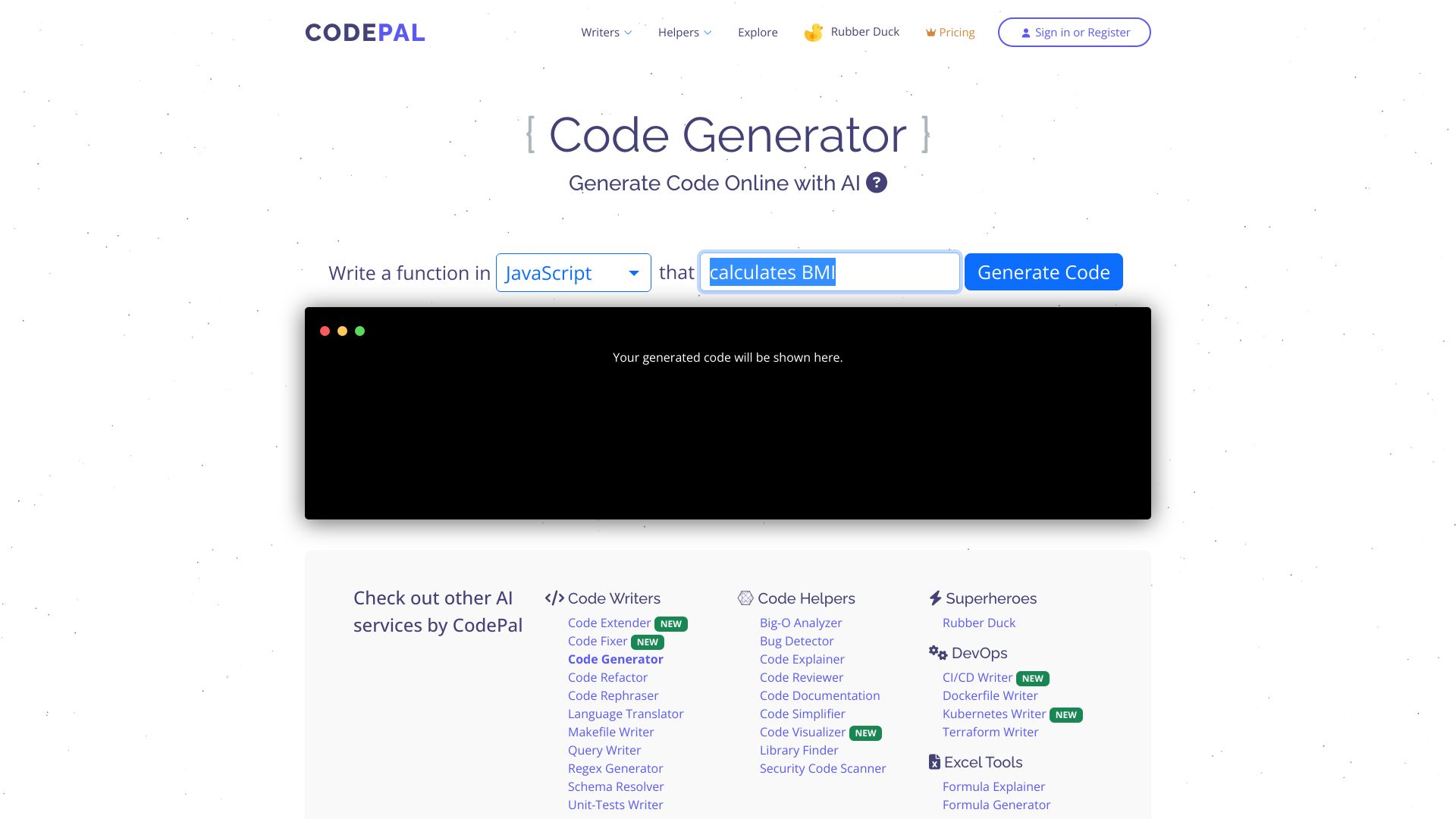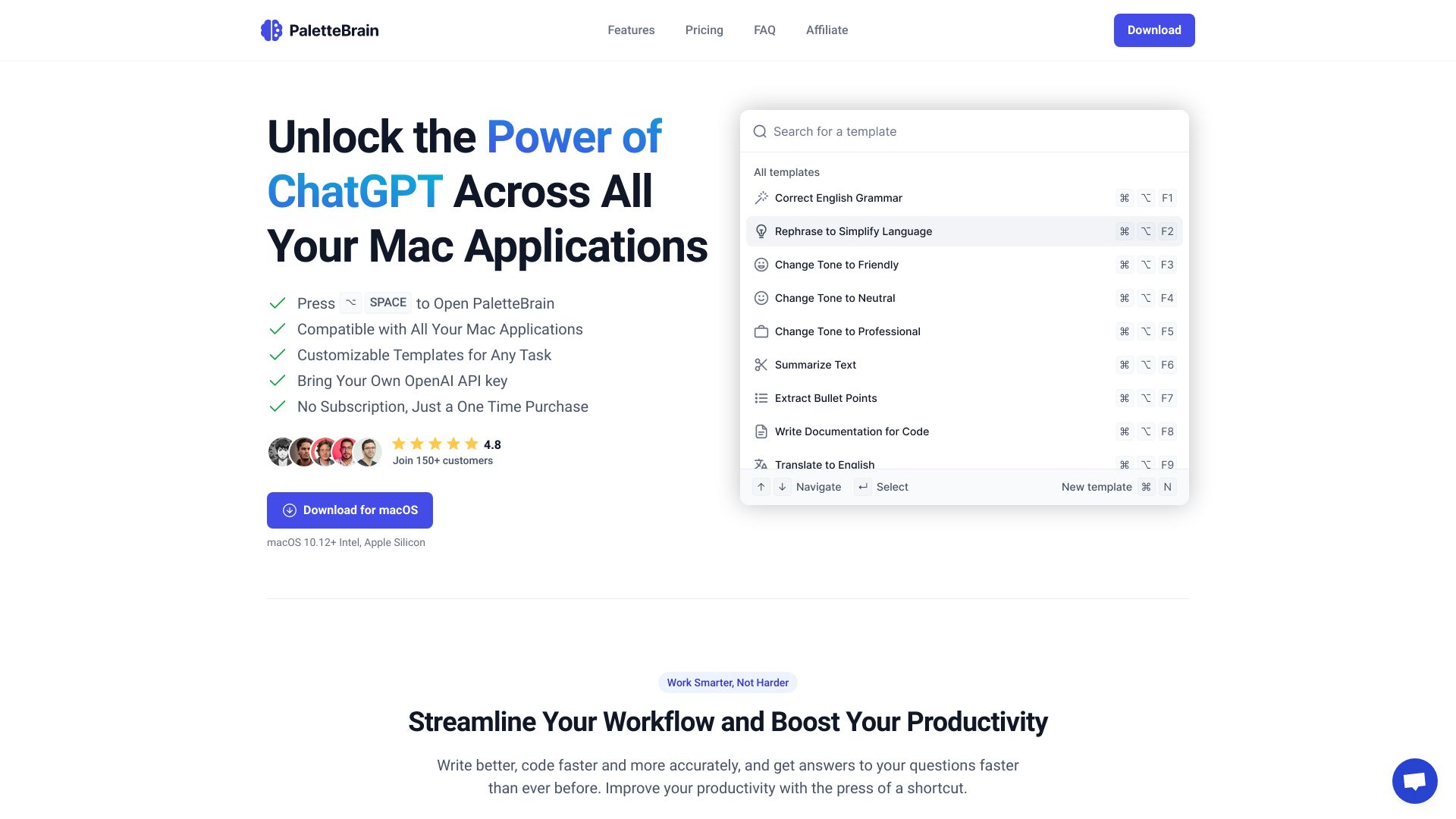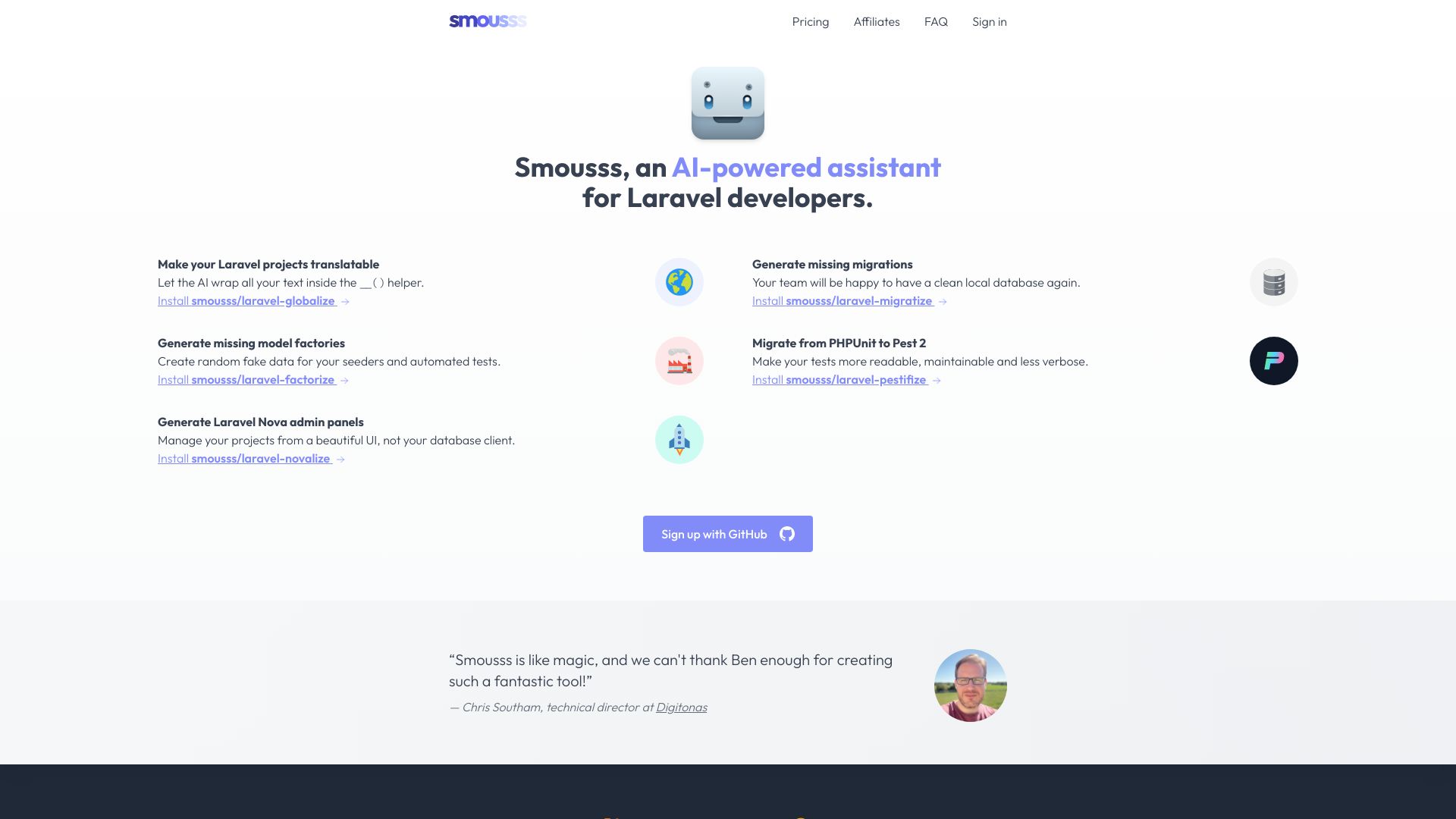CodePal

CodePal Information:
company name: CodePal
login: https://codepal.ai/login?return_to=/
register: https://codepal.ai/login?return_to=/
contact information: https://share-eu1.hsforms.com/173wSkWA1Q8SoXbFQvrQSoA2b98qx
pricing: https://codepal.ai/#pricing
github: https://github.com/apps/codepal-bot
What is CodePal:
CodePal is a comprehensive platform that offers a range of coding helpers and tools to assist developers. It is great for students, beginners, experienced developers, and companies who want to improve their development process.
CodePal's Core Features
- AI-powered code generation from plain language
- Code analysis and bug detection
- Code review and documentation
- Code simplification and visualization
- Unit test generation
- Integration with popular development environments
- 30+ supported programming languages and technologies
CodePal's Use Cases:
- Generating boilerplate code
- Generating database schemas or queries
- Generating API client code
- Automatically generating test cases
- Automating repetitive or mundane coding tasks
- Optimizing code performance
- Rapid prototyping in web development, mobile app creation, and data science
FAQ from CodePal:
What is CodePal?
CodePal is a comprehensive platform that offers a range of coding helpers and tools to assist developers. It is great for students, beginners, experienced developers, and companies who want to improve their development process.
How to use CodePal?
To use CodePal, simply enter plain words or descriptions of the code you want to generate in the text input. Select the programming language or technology you want to generate code in. The AI-powered tool will then generate working code based on your input. You can also utilize other tools and helpers available on the platform to analyze, review, refactor, and simplify code, among other tasks.
What is CodePal?
CodePal is your ultimate coding companion. It is a comprehensive platform that offers a range of coding helpers and tools to assist developers. It is great for students, beginners, experienced developers, and companies who want to improve their development process.
What do I get with the free plan?
The free plan includes access to all the tools and helpers, but with some limitations. It's a great option for hobbyists who want to try out CodePal.
Which programming languages and technologies are supported at CodePal?
CodePal supports the following programming languages, technologies, and frameworks: ActionScript, Ada, AppleScript, Arduino, Assembly, AutoHotkey, Bash, Basic, Brainfuck, C, C#, C++, Clojure, COBOL, CoffeeScript, Dart, Elixir, Erlang, Go, Haskell, Java, JavaScript, Julia, Kotlin, Lua, MoonScript, Objective C, Perl, PHP, PineScript, PowerShell, Prolog, Python, R, Ruby, Rust, Scala, Scratch, SQL, Swift, TypeScript, VBScript, ZenScript, and more.
What can AI Code Generator do?
AI Code generators can perform a variety of tasks such as programming, applying transformations and manipulations on the code, and many other tasks. They are very useful for learning and can give a good grasp of how a given task should be written in code.
What is computer code generation?
Code generation is the process of automatically creating computer source code from a higher-level representation, such as a design specification, a graphical model, or a natural language description. CodePal uses AI to translate plain words into computer code.
What are some benefits of using code generation?
Code generation can save time, reduce errors, improve the quality and maintainability of code, and make code more consistent and portable. By automating the process of generating code, developers can focus on higher-level tasks and ensure that their code is correct and consistent.
What are some potential drawbacks of using code generation?
While code generation can be a powerful tool, it is important to be aware of potential drawbacks. For example, code generators may produce code that is difficult to understand or modify by humans, and they may also generate code that is less efficient than hand-written code. Additionally, code generation may not be well-suited for all programming tasks or environments, and may require a significant investment in time and resources to set up and maintain.
What programming languages are commonly used for code generation?
Code generation can be used with many different programming languages, including Java, C#, Python, and TypeScript, among others. The choice of programming language will often depend on the specific needs of the project, as well as the availability of code generation tools and frameworks for that language.
Can code generation be used for testing and debugging as well?
Yes, code generation can be used for testing and debugging as well. For example, some code generation tools can generate test cases based on specifications or application code, or automatically generate mock objects to facilitate testing. Additionally, code generation can be used to automatically generate debugging code, such as logging statements or error-handling code.
What are some common use cases for code generation?
Code generation can be used in many different contexts, including web development, mobile app development, data analysis, and scientific computing, among others. Some common use cases for code generation include generating boilerplate code, generating database schemas or queries, and generating API client code.
What are some challenges associated with code generation?
Some challenges associated with code generation include the need to maintain generated code over time, the potential for generated code to become out of sync with underlying models or specifications, and the need to ensure that generated code is efficient and adheres to best practices. Additionally, generating code that is easy to understand and modify by humans can be a challenge, as generated code can often be difficult to read and debug.
How can code generation be used in low-code or no-code development environments?
Code generation can be used in low-code or no-code development environments to help automate the process of generating code based on visual models or drag-and-drop interfaces. For example, some low-code platforms use code generation to automatically generate code for building user interfaces or data models based on user-defined specifications. Additionally, code generation can be used to generate code for integrating low-code platforms with other systems or services.
Can code generation be used to optimize performance of software applications?
Yes, code generation can be used to optimize the performance of software applications by generating code that is optimized for specific hardware or execution environments. For example, code generation can be used to generate SIMD (Single Instruction, Multiple Data) code for performing vectorized calculations on modern processors, or to generate GPU code for performing parallel computations on graphics cards.
How does code generation differ from code scaffolding?
Code generation and code scaffolding are similar in that they both automate the process of generating code. However, code generation typically involves generating a more significant amount of code, often based on more complex models or specifications. Code scaffolding, on the other hand, typically involves generating a smaller amount of code, often based on simpler templates or conventions.
How can code generation be used to improve developer productivity?
Code generation can be used to improve developer productivity in several ways. For example, code generation can automate the process of generating boilerplate code, reducing the amount of manual coding required. Additionally, code generation can help ensure that code adheres to best practices and industry standards, reducing the likelihood of errors or bugs. Finally, code generation can help reduce the cognitive load on developers by automating repetitive or mundane coding tasks, allowing them to focus on higher-level design and problem-solving.
How do AI-driven code generators differ from traditional ones?
AI-driven code generators leverage machine learning and natural language processing to understand user requirements and generate code. Unlike traditional generators that rely on predefined templates, AI-driven tools can adapt to various contexts, making them more versatile and accurate.
What's the role of neural networks in AI code generation?
Neural networks, especially transformer-based models, have shown significant promise in understanding and generating code. They can predict the next token in a code sequence, understand context, and even fix bugs, enhancing the capabilities of AI code generators.
How secure is the code produced by AI code generators?
While AI code generators can produce efficient code, it's essential to review and validate the generated code for security best practices. AI models might not always consider security implications, so manual oversight is recommended.
Can AI code generators understand and implement complex algorithms?
Yes, advanced AI code generators can understand high-level descriptions of complex algorithms and generate corresponding code. However, the clarity of the user's instruction and the capability of the AI model play crucial roles.
How do AI code generators handle ambiguous requirements?
AI code generators might ask for clarifications or make assumptions based on the training data they've seen. It's always a good practice to provide clear and concise requirements to get the most accurate code output.
Are there any industries or sectors where AI code generation is particularly beneficial?
AI code generation is beneficial across various sectors, especially in web development, mobile app creation, data science, and any domain requiring rapid prototyping. It accelerates development and reduces manual coding efforts.
How do AI code generators impact the job market for developers?
While AI code generators automate certain tasks, they don't replace the need for skilled developers. Developers can use these tools to enhance productivity, focus on complex tasks, and ensure high-quality code. The role of a developer evolves to be more design and logic-centric rather than purely coding.
Can AI code generators integrate with existing development environments?
Yes, many AI code generators offer APIs or plugins that can integrate with popular development environments and IDEs. This seamless integration enhances the developer's workflow by providing real-time code suggestions and automations.
How do AI code generators handle domain-specific languages or niche programming tasks?
Advanced AI code generators can be trained on domain-specific languages or niche tasks, provided they have enough training data. However, their efficiency might vary based on the specificity and complexity of the language or task.
What's the future of AI in code generation and software development?
The future of AI in code generation is promising, with advancements in AI models leading to more accurate and versatile code generators. We can expect tighter integrations with development tools, real-time collaboration features, and AI-driven debugging and optimization tools.


